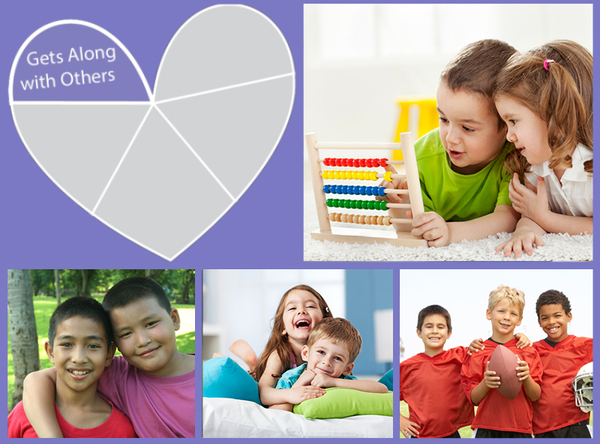Heart-Mind Challenge: Getting Along With Others

What is the quality “Gets Along with Others”?
What does getting along with others look like?
What does it look like when that quality is diminished?
Why is it helpful/useful to have this quality?
|
Try some social games such as:
· Follow the leader
· Cooperative building – e.g. sharing blocks, using cardboard boxes, constructing a pillow fort
· Charades
· A Blindfold Walk in pairs
· Role playing – from pretend play for young children to mock job interviews for teens
Tell your child what he or she did well with words, a smile, a thumbs-up or a pat on the back. Be both descriptive and convey some enthusiasm (check your body language!). Even if the behaviour could improve, describe the effort as well as the success. Adapt the “fill your bucket” concept in your home, school or neighbourhood. Read more here.
Children need the chance to try out skills on their own and develop confidence at managing peer relations. Adults who are more controlling, directive and intrusive during playtime reduce this opportunity. At the other extreme, those who don’t have any involvement in play lose the opportunity to guide and mentor a child’s skill development. What is your style? Take this parenting quiz. Whether you are a parent, caregiver, teacher or great uncle, your style when interacting with children influences this important child-adult relationship.
Build skills to manage emotions and stress by: · spending more time in nature
· practicing mindfulness – be in the moment
· learn to BREATH deeply
· expressing emotions through writing, art and music.
Find these book in your local library! PICTURE BOOKS
Sheila Rae’s Peppermint Stick, by Kevin Henkes
Chester’s Way, by Kevin Henkes Enemy Pie, by Derek Munson I Am I, by Marie-Louise Fitzpatrick The Araboolies of Liberty Street, by Sam Swope CHAPTER BOOKS
Because of Winn-Dixie, by Kate DiCamillo
Surviving the Applewhites, by Stephanie S. Tolan Diary of a Wimpy Kid, by Jeff Kinney The Doll People, by Ann M. Martin Martin Bridge: In High Gear!, by Jessica Scott Kerrin Charlotte’s Web, by E.B. White Challenge book recommendations from a Children’s Librarian, Vancouver Regional Library.
Children and youth have to be allowed to make mistakes and be attended to in a gentle and supported way. While it is important to allow children and youth some opportunities to work out their difficulties, at a certain point, adults need to step in to help. Helping to work through social challenges is a teaching opportunity. |
|||








Comments
Post new comment